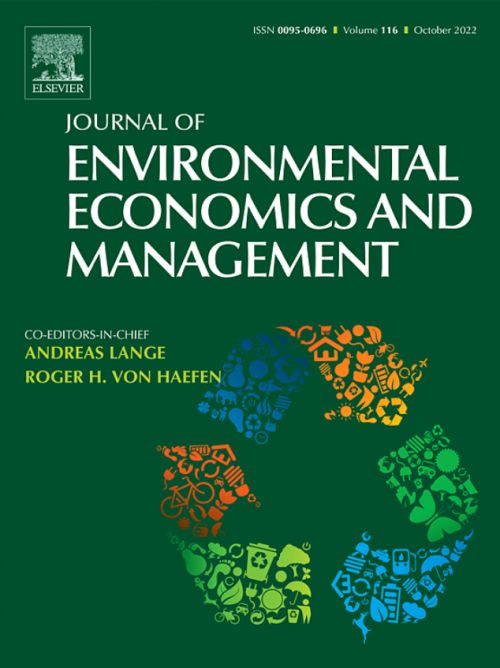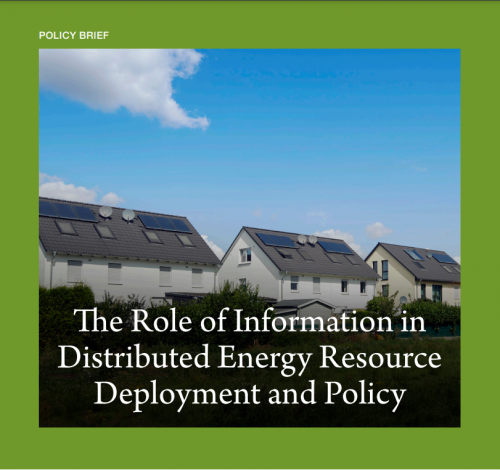-
Comments to FTC on Commercial Surveillance and Data Security
In August, the Federal Trade Commission released an advance notice of proposed rulemaking seeking comment on avenues to regulate commercial surveillance and data security practices that harm consumers. Policy Integrity submitted comments recommending that the FTC regulate “immortal accounts,” a practice by which entities make it difficult or impossible to delete a consumer account in order to retain and profit from the user’s data and continue charging subscriptions. Our comments were based on a report that we recently published establishing the Commission’s authority to regulate this pervasive practice.
-

Do Non-Damaging Earthquakes Shake Mortgage Lenders’ Risk Perception?
Working paper in Journal of Environmental Economics and Management
This study examines how banks respond to earthquakes that convey seismic risk salience but do not cause damage, i.e., noticeable non-damaging earthquakes (NNDEs). Using evidence from California, we find loans more likely to be denied or sold after increased NNDEs. Banks with fewer assets, more diversified branching markets, or stronger sales capability relied more on securitization to transfer the perceived seismic risk. We show evidence that banks likely learned about the NNDEs through personal experience and local news. The effects of NNDEs persisted up to three years. Meanwhile, the NNDEs only caused moderate and temporary collateral devaluation but did not increase the observable default risk. Thus, banks' responses most likely resulted from the increased risk salience of future damaging earthquakes during the mortgage term. Our findings call for reevaluations of the heuristics in banks' risk-perception updating and have implications for designing more efficient disaster risk-sharing mechanisms in the financial market.
-
Comments on HHS Streamlining Rule
Policy Integrity submitted comments to the Centers for Medicare & Medicaid Services (CMS) in support of its proposed rule to streamline applications and eligibility determinations for Medicaid, the Children's Health Insurance Program, and the Basic Health Program. Our comments encourage CMS to strengthen the Proposed Rule's cost-benefit analysis by describing the many health and economic benefits that result from increased access to healthcare and engaging in a more robust distributional analysis.
-

The Role of Information in Distributed Energy Resource Deployment and Policy
While appropriate compensation for DERs has received considerable attention in DER policy discussions, one important dimension has received less attention: informational gaps and asymmetries. In particular, key information about distribution networks, energy consumption, and marginal emission rates is often either entirely lacking or readily available only to some parties. Such information disparities can impede effective policymaking. To overcome the inefficiencies information asymmetry creates, regulators must carefully tailor disclosure mandates and incentives for utilities, as these actors often have little incentive to go beyond the letter of the law in data disclosure.
-
Joint SC-GHG Comments on DOE Standards for Consumer Furnaces
Together with partner groups, we submitted joint comments to the Department of Energy (DOE) on its proposed rule to strengthen energy conservation standards for consumer furnaces. Our comments applaud the agency for appropriately applying the social cost of greenhouse gases to estimate the climate benefits of the proposed standards, even though the standards would be cost-benefit justified without considering any climate benefits. We also expand upon DOE's justifications for adopting a global damages valuation and for the range of discount rates it applies to climate effects.
-
Joint SC-GHG Comments on DOE Standards for Pool Pump Motors
Together with partner groups, we submitted joint comments to the Department of Energy (DOE) on its proposed rule to strengthen energy conservation standards for dedicated purpose pool-pump motors. Our comments applaud the agency for appropriately applying the social cost of greenhouse gases to estimate the climate benefits of the proposed standards, even though the standards would be cost-benefit justified without considering any climate benefits. We also encourage DOE to expand upon its rationale for adopting a global damages valuation and for the range of discount rates it applies to climate effects.
-
Comments to SEC on ESG Disclosures
The SEC has proposed a series of new disclosures for investment companies regarding their Environmental, Social, and Governance (ESG) activities. These disclosures would reduce "greenwashing" - a practice where companies misrepresent the sustainability of their investments in order to advertise to investors looking to invest in green funds - by providing investors with comparable and decision-useful information about fund practices. We submitted comments on the SEC's economic analysis of the Proposed Rule. We commend the Commission for complying with relevant case law and internal guidance on cost-benefit analysis and recommend steps that the SEC could take in the final rule to provide additional clarity and context regarding its findings.
-
Comments to SEC on Investment Company Names
The SEC has proposed a rule that would better align the names of investment companies with investor expectations, including for Environmental, Social, and Governance (ESG) investment funds, by requiring portfolio distribution requirements for funds whose name connotes a particular investment strategy. We submitted comments on the SEC's economic analysis of the Proposed Rule. We commend the Commission for complying with relevant case law and internal guidance on cost-benefit analysis and recommend steps that the SEC could take in the final rule to provide additional clarity and context regarding its findings.
-
Joint SC-GHG Comments on Commercial Water Heating Equipment
Together with partner groups, we submitted joint comments to the Department of Energy (DOE) on its proposed rule to strengthen energy conservation standards for commercial water heating equipment. Our comments applaud the agency for appropriately applying the social cost of greenhouse gases to estimate the climate benefits of the proposed standards, even though the standards would be cost-benefit justified without considering any climate benefits. We also encourage DOE to expand upon its rationale for adopting a global damages valuation and for the range of discount rates it applies to climate effects.
-
Joint Comments to SEC on its Proposal to Enhance and Standardize Climate-Related Disclosures
Together with the Environmental Defense Fund and Professor Madison Condon of Boston University School of Law, we submitted three sets of comments to the Securities and Exchange Commission (SEC) in support of its Proposed Rule on the Enhancement and Standardization of Climate-Related Disclosures for Investors (Proposed Rule). The Proposed Rule would require publicly traded companies to disclose important information about the extent to which climate change is already affecting their financial performance, their approach to climate-related risk management, their climate-relevant governance structures, and their greenhouse gas emissions, which serve as a proxy for exposure to risk from policy- and market-driven shifts to a clean-energy economy.
Viewing recent projects in Consumer and Healthcare Protection






